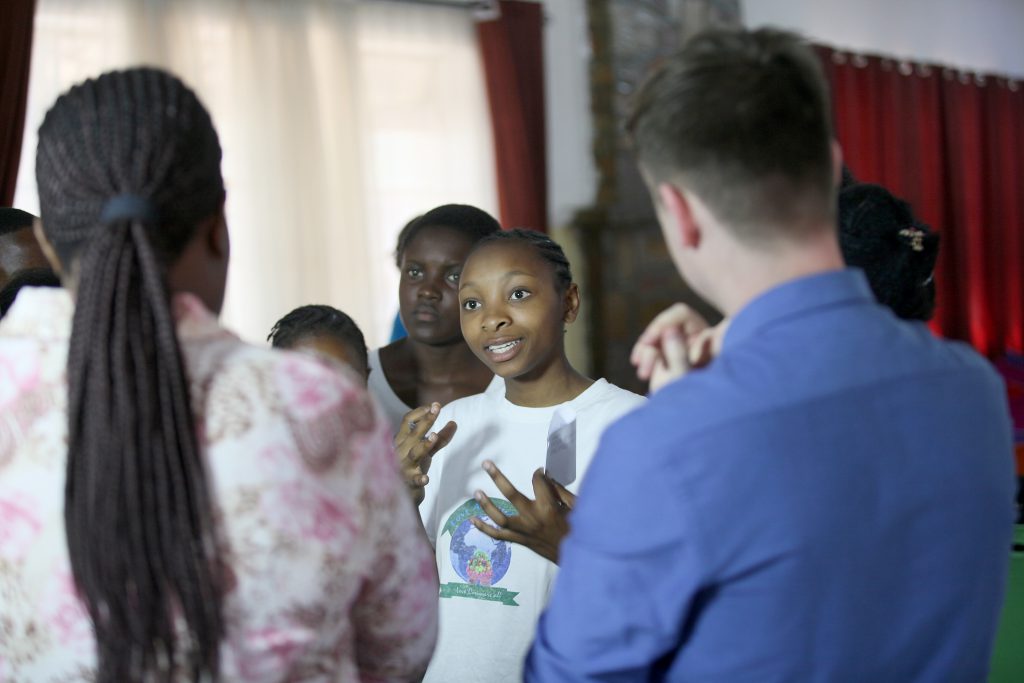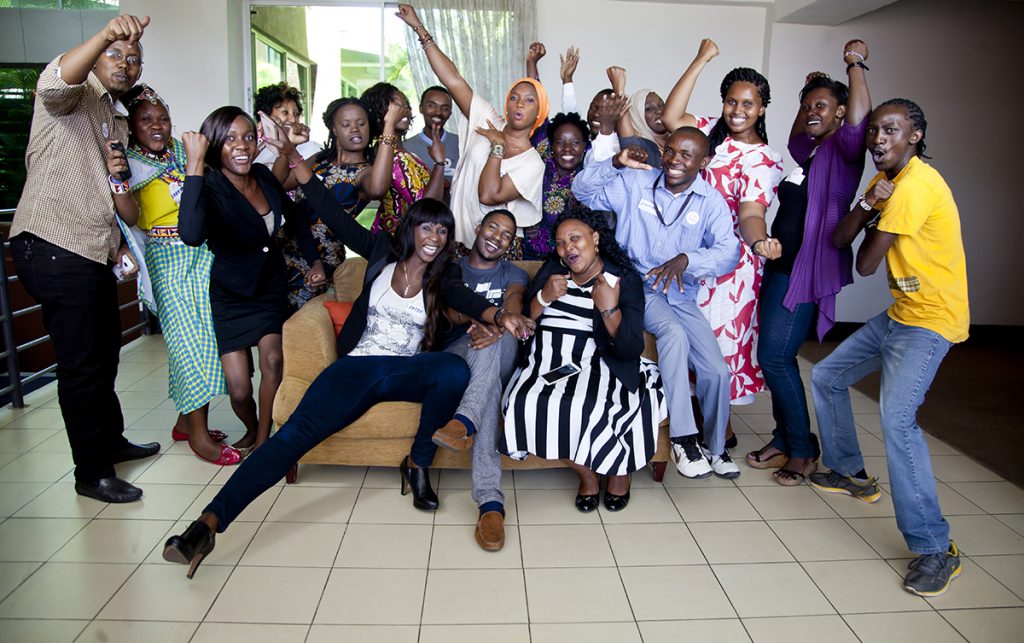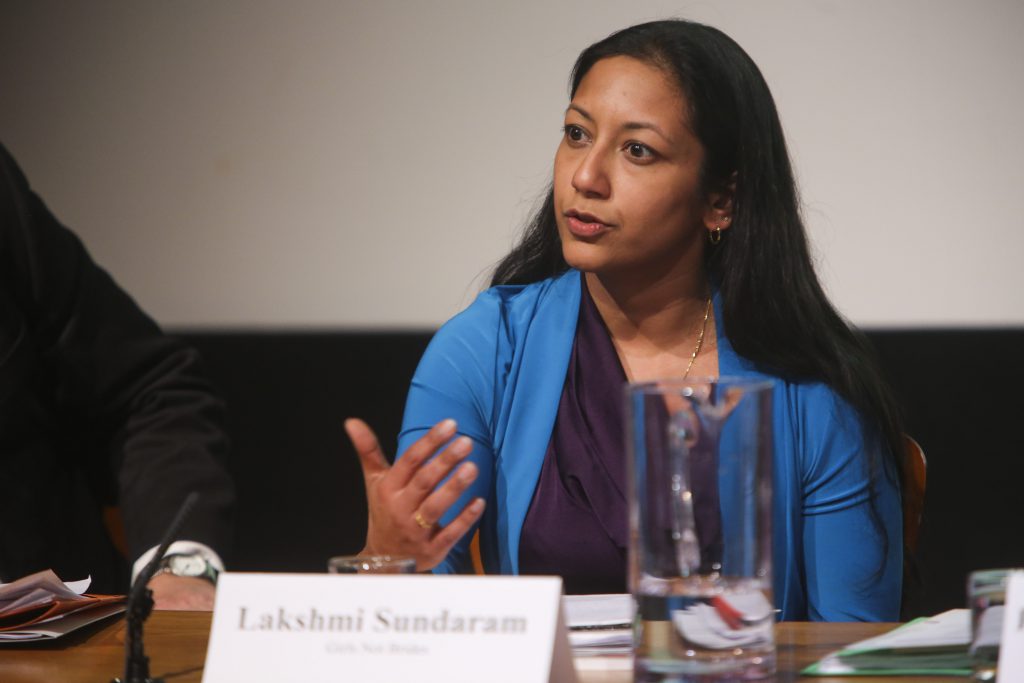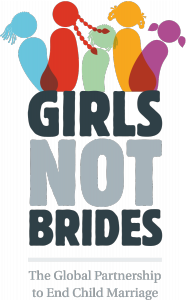Every two seconds, a girl becomes a child bride. Tragically, child marriage affects millions of girls each year around the world. We can change this. Together, we can end child marriage.
Girls Not Brides is a pioneering global partnership of civil society organisations whose key purpose is to end child marriage by working together.
Galvanised by this collective spirit, W4 has entered into an exciting partnership with Girls Not Brides! Our partnership will provide capacity-building and funding opportunities specifically for grassroots civil society organisations in Francophone Africa that are working tirelessly and courageously on the ground to end child marriage.
This article – an interview with Lakshmi Sundaram, Executive Director of Girls Not Brides – is the first in a series about child marriage and the solutions that exist to put an end to child marriage.

An adolescent girl talks about a girls’ empowerment club during a school visit in Lusaka, Zambia.
Photo credit: Vatice Mushauko / Girls not Brides
Please tell us a little about the mission and activities of Girls Not Brides.
Girls Not Brides is a global partnership of over 800 civil society organisations around the world, all committed to ending child marriage. We share the conviction that every girl has the right to lead the life that she chooses and that, by ending child marriage, we can achieve a safer, healthier and more prosperous future for all.
Together, we are stronger. Girls Not Brides members work to keep child marriage on the global agenda, to build an understanding of what it will take to end child marriage, and to call for the laws, policies and programs that will make a difference in the lives of millions of girls.
“Community-based organisations have a critical role to play in ending child marriage; we can’t end the practice without them. Their work needs to be supported, and we need to make sure we are continuously highlighting their knowledge and experiences, especially in international discussions.”
– Lakshmi Sundaram, Executive Director, Girls Not Brides
Could you tell us about the Theory of Change?
Each year, 15 million girls are married before the age of 18. So, how can we achieve a world without child marriage, one in which girls and women are free to enjoy equality with boys and men? Girls Not Brides has worked with over 150 members and experts to create a comprehensive Theory of Change that demonstrates the range of approaches needed to end child marriage.
There is no single solution to end child marriage, but there are a number of steps that help set girls on a path to a better future. Our Theory of Change makes clear that work is needed across four major areas: empowering girls, mobilising families and communities, providing services, and establishing and implementing laws and policies.
The Theory of Change emphasises that everyone, everywhere has a role to play in ending child marriage. We need long-term, sustainable efforts in communities as well as from the government. There need to be collective efforts at national, regional, and international levels.
Our Theory of Change also stresses the importance of:
- Investing for the long term;
- Funding effective strategies;
- Sharing promising practices;
- Coordinating efforts to avoid duplication.
Without this comprehensive approach, we won’t be able to achieve change at scale for the 15 million girls who are currently married every year.

Girls Not Brides and Youth for Change youth advocates get ready for the Africa Girl Summit on child marriage in Lusaka, Zambia.
Photo Credit: Girls Not Brides
In your experience, what are the main challenges faced by grassroots organisations working to end child marriage in Sub-Saharan Africa?
The majority of Girls Not Brides members are small, grassroots, and community-based organisations. They face many challenges, but often their biggest struggle is securing the funding they need to sustain and scale their efforts to end child marriage. While their staff are devoted, they tend to have too few and little capacity and experience in identifying funding opportunities, connecting with donors, and writing funding proposals and reports.
“Grassroots organisations do such amazing work, often in really difficult contexts, but this is not recognised enough. This means that it can be really difficult for them to tell their stories,
share their expertise, and raise the resources they need
to support, improve and expand their work.”
– Lakshmi Sundaram, Executive Director, Girls Not Brides
As a global partnership, we help our members to continue their great work. We know that funding is an urgent issue. That’s why it is a focus of our new 2017–2020 strategy.
Over the next four years, Girls Not Brides will help foster opportunities and identify funding sources for our members. Our strategy also stresses the importance of dedicating resources in national budgets, across all ministries, and towards community-based organisations.
This is why our partnership with Women’s World Wide Web (W4) is so important to us, for the benefit of our members.
“I am incredibly excited by this new partnership. It will allow Girls Not Brides members to tap into new ways of fundraising, and will also help them build the skills they need
to present their work to a global audience.”
– Lakshmi Sundaram, Executive Director, Girls Not Brides
What are the most effective ways of helping these grassroots organisations to overcome these challenges and carry out their crucial work?
Helping grassroots organisations overcome these challenges is at the heart of what Girls Not Brides does – and what our partnership with W4 is about. Here are our priorities:
- Build the organisations’ knowledge of donors working on child marriage;
- Help strengthen the organisations’ relations with donors, evaluate funding opportunities, pitch their projects and prepare proposals and reports;
- Improve the organisations’ visibility through crowdfunding sites (like this one!), our own site, and the organisations’ own online platforms.
- We are, of course, only part of the answer. We encourage other donors in this sector to review how they are supporting grassroots organisations and increase their support – both financially and in kind.
Sadly, child marriage remains widespread around the world. What are the benefits of preventing child marriage, in terms of improving girls’ and young women’s welfare and life prospects, and also for wider socio-economic progress (particularly in Sub-Saharan Africa)?
A world without child marriage is a world where girls are free from violence, are able to stay in school, be healthy, and become empowered. Right now, too many girls are dying from complications related to pregnancy and childbirth – the vast majority of these girls are married. Too many girls are forced into relationships where they have little say.
Ending child marriage will open up a realm of opportunities for girls and women everywhere.
“If child marriage ended right now, millions of girls around the world would be able to make decisions about their own futures, and lead more productive lives.”
– Lakshmi Sundaram, Executive Director, Girls Not Brides
Ending child marriage is also key to achieving 8 of the 17 Sustainable Development Goals. The practice of child marriage presents a barrier to tackling poverty, improving nutrition, health and education, and achieving economic growth.
Recent research by the World Bank shows that beyond benefits to girls, their families and communities, ending child marriage will also benefit countries’ finances. If child marriage had ended in 2015, the global economy could have saved $566 billion by 2030! This groundbreaking research shows that the costs of child marriage are in the trillions — and the economic benefits of ending it are also in the trillions! Find out more about the impact of child marriage.

Lakshmi Sundaram, Executive Director of Girls Not Brides, speaks at a Too Young to Wed panel discussion on child marriage during the Commission on the Status of Women in 2013.
Photo Credit: Gary He / UN Foundation
W4 and Girls Not Brides have entered into a partnership (and W4 is thrilled about this!) to support small, grassroots organisations that are addressing the issue of child marriage in Francophone Africa. What do you hope to achieve through this partnership?
We are delighted to partner with W4! Your aims and objectives are in line with ours – to support small, grassroots organisations who struggle to access funding and capacity-building, and to help them continue their amazing work.
Together, we can support these organisations who work directly with the communities and girls affected by child marriage, tirelessly striving to catalyse positive change.
How can individuals support the work of Girls Not Brides?
There is currently not nearly enough funding available to match the global scale or urgency of child marriage. We encourage any donors who want to join the movement to end child marriage to support our members’ work directly or to donate to our members’ projects on our Take Action page.
So, please visit our website Girls Not Brides to learn more about our members and their amazing work – and support them!














